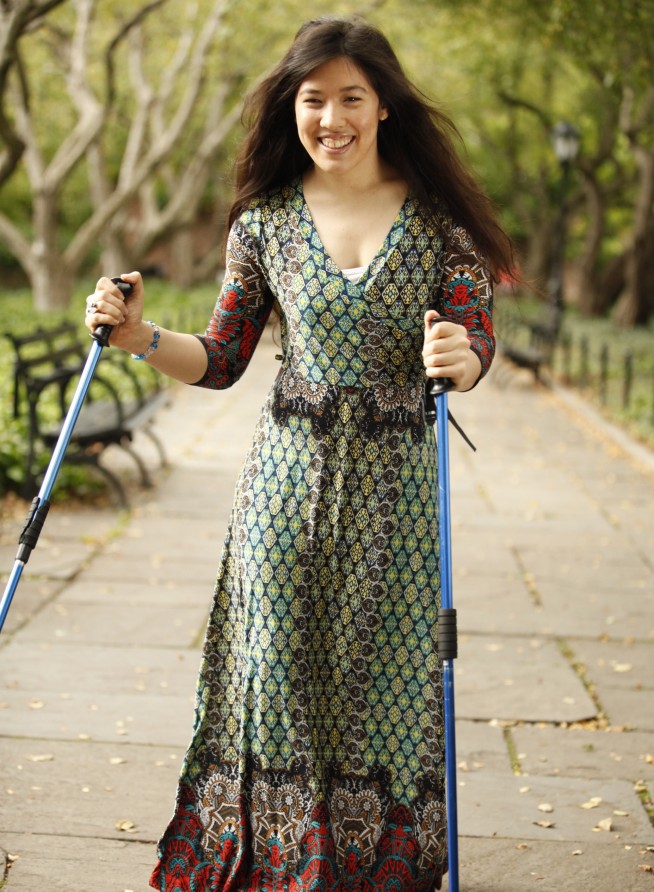One of the hardest things in life for most people is knowing when to ask for help. One of the blessings of my having a visible disability for a lifetime is that I’m more comfortable asking for help than most. I’ve had lots of practice, and living in a big city, lots of unsolicited aid. This has been the beginning of many unlikely friendships and my favorite byproduct of Cerebral Palsy. Getting to see the kinder, softer side of New Yorkers.
Still, the most giving and helping humans tend to have the hardest time asking for help. It can be uncomfortable, even painful. Is it that being vulnerable enough to ask for help threatens our sense of independence?
Is that why many of my students say “I hate when people try to help me.” Are they really saying “I feel bad when I’m not seen as independent,” or “I’m just not getting the help I really need.” From the outside, it may be a bit of both. I think is a fairly common problem because people want to be seen as independent no matter who we are (whether six or eighty-six).
Yet, we are at our best when we know we all connected, and when we know we are not alone.
@XianForBeauty83 (Click to Tweet!)
So shouldn’t we feel good when we are not only helping, but receiving help of some kind? I’ve always said people’s offers and acts of kindness touch my heart, because I look at the intention behind the deed.
But what if we could match needs with knowledge, understanding, and good intention?
This is the unique possibility that the AT&T NYU Connect Ability Challenge, A Global Assistive Technology Competition presents. To my surprise and great honor, I was asked to be an ‘Exemplar’ for innovation – someone whose story they would tell and someone whose needs they could design around.
In celebration of the 25th Anniversary of the ADA, NYU and AT&T have created a global Assistive Technology competition to encourage developers to innovate for people with disabilities’ needs (and ideally for universal design). I am one of four Exemplars whose stories and videos they are showcasing to motivate innovation. The other exemplars are such great examples, they have blindness, autism, and M.S. and are contributing amazing things through teaching, filmmaking, sports (please view the videos below, if you have time). The four of us will also be judges.
I’m used to saying that practical things aside, my disability has not limited me at all (which is still true). But I had never had anyone push me to consider the practical and say in your wildest dreams, how could we help make your daily life easier? How can we help you spread your message more effectively?
As AT&T and NYU asked these questions I really had to dig: What do I need? I wasn’t used to thinking about these things, because I have always ignored the practical as just part of my reality. I’d always found (albeit unconventional) ways around them. When lazy, I use my ski poles to turn lights or the TV on or off. I have always been more focused on ideals and concepts, freeing ideas for my students, or an audience; never truly spatially aware. My mom has always said that receiving help weakens you from your highest potential. But what if asking for help could be empowering? What if asking for help can lead to breakthroughs not only in technology but also our lives?
Sometimes, we just don’t know how to help. Sometimes, (and even most dangerously) we are too proud to ask for help. But we can miss out on so much beauty! This is why communication is so important. This is what makes the project we’re working on so special. Because AT&T and NYU Poly came to me and three other amazing people with disabilities and asked us to share our stories and how they could help us. They have asked for our feedback with the team and developers at every step. Because creating something truly helpful for someone that walks with ski poles can also help someone whose hands need to grip the wheels of a wheelchair, or someone looking down at their phone as they walk or drive. Because helping the four of us with very different disabilities can ultimately and ideally help everyone.
Here’s my story:
Xian Horn:
Gus Chalkias:
Jason DaSilva:
Paul Kotler:
Let’s let the positivity pour out and empower each other! Help me spread the word!
Share these videos and news of this groundbreaking competition with friends and developers, and share with me: What do you need help with? Have you struggled with asking for help? How do you think tech can help you? Can’t wait to hear from you! I’ve missed you – it’s good to be home!
Xian Horn is a joyful half-Asian woman with Cerebral Palsy, serving as writer, mentor, and positivity activist. A member of an international network of extraordinary women, 85 Broads, she was heralded by founder Janet Hanson as an “amazing role model for all women.” With her personal stories and ongoing mentoring work, Xian is invested in contributing positively to self-esteem and the collective self-image, especially for women. To support her True Beauty efforts for people with disabilities, please join her Facebook community and follow her on Twitter.












